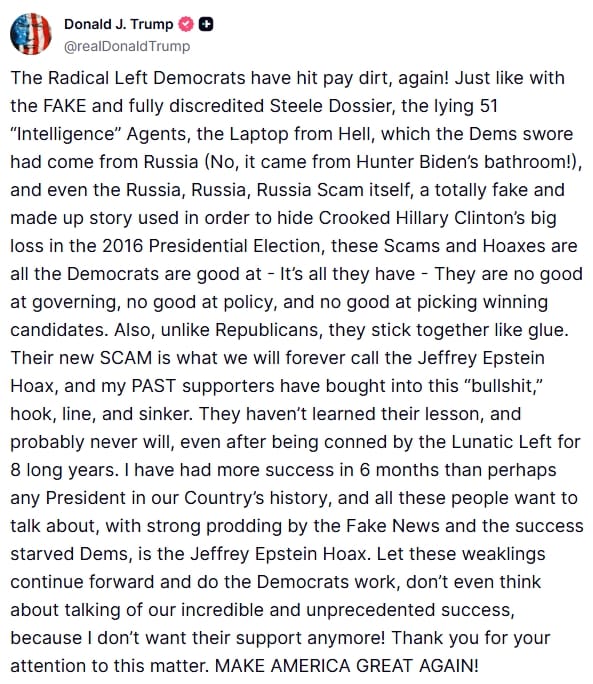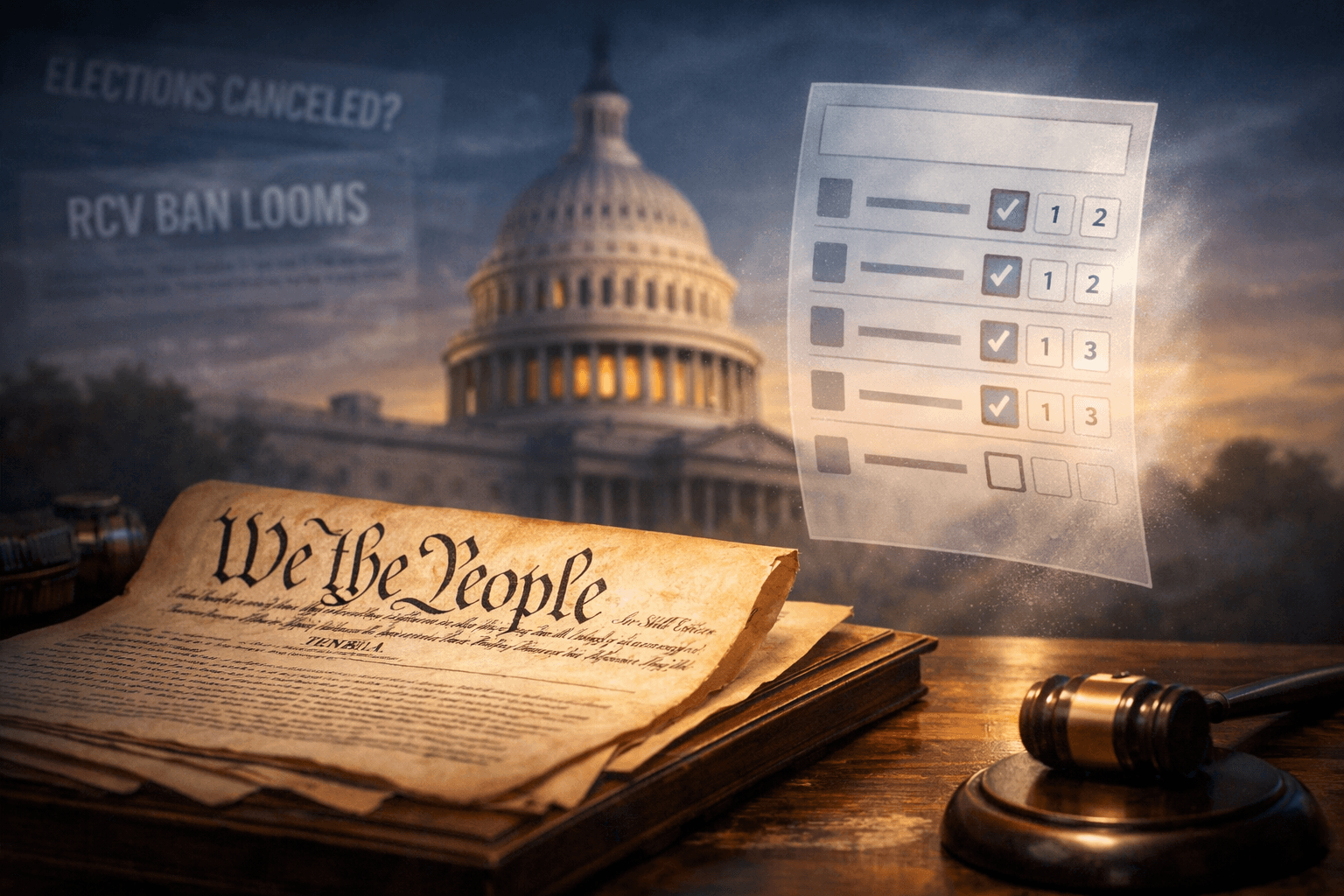Unlikely Bedfellows: The Strange Alliance to Expose Epstein Files

President Donald Trump is working hard to put a lid on the Jeffrey Epstein controversy roiling his party. So far, it isn’t working. One procedural tool in Congress, a little-used but powerful discharge petition, could push the issue out of Trump’s control.

Last week, Trump’s Justice Department released an unsigned memo concluding that Epstein died by suicide and that no “client list” exists. Since then, Trump has lashed out at those demanding more transparency, a group that includes GOP lawmakers, administration officials, and MAGA influencers, calling them “weaklings” who have been “duped” by a Democratic “hoax.” His message: “There’s nothing else to see here, move along.”
But cracks are showing in his party’s unity. A Quinnipiac University poll released Wednesday found nearly as many Republicans disapprove (36%) as approve (40%) of the administration’s handling of the Epstein case. A CNN poll echoed the discontent, showing 40% of Republicans are “dissatisfied” with government disclosures while just 4% say they are satisfied.
If Congressional Republicans truly want answers, there is one rarely used weapon at their disposal – the discharge petition. It’s rarely used, but maybe a dead man can pull it off.
Massie and Khanna Lead the Charge
Republican Rep. Thomas Massie of Kentucky and Democratic Rep. Ro Khanna of California are spearheading a discharge petition to compel a vote on releasing all Epstein-related files.
So far, two other Republicans, Reps. Marjorie Taylor Greene of Georgia and Eric Burlison of Missouri have said they will sign on. Massie also noted that five others support the underlying bill, though they have not yet endorsed the discharge petition itself.
If six Republicans join all 212 House Democrats, they could hit the magic number of 218.
What Is a Discharge Petition and Why Does It Matter?
A discharge petition is a rarely successful but symbolically potent move in the House. If 218 members sign on, a majority of all House seats, rather than just those present, they can force a floor vote even over leadership’s objections.
It is a high bar. Members of the majority party often avoid bucking their leadership, and party leaders have many ways to pressure or punish those who try. Only about 4% of discharge petitions succeed in forcing a vote, according to Sarah Binder, a senior fellow at the Brookings Institution.
But the Epstein controversy might be different.
A Threat Even If It Fails
Even if the discharge petition falls short, it could still force movement. Binder notes that while only 4% of petitions result in a direct vote, they have triggered votes on similar measures about 8% of the time.
The threat of embarrassment alone, making it look like Trump has lost control of his party, might prompt the administration to release more information or offer a partial compromise.
A Test of Resolve
But the numbers only tell part of the story. Congressional expert Matt Glassman of Georgetown University told CNN that what a discharge petition really requires is not just 218 members, but 218 ‘hellbent’ members.
“Trump seems very involved here, and not too many members want to stick their necks out against him, even if it’s on an issue where the Trump GOP base seems split from the president,” Glassman told CNN.
According to CNN, more Republicans support the underlying bill than the discharge petition. Getting a handful of members on board is one thing; becoming the decisive Republican and the 218th House member to greenlight something Trump doesn’t want is something else entirely.
Why Epstein, Tucker Carlson, and Candace Owens Could Break MAGA Unity
The Epstein case taps into a deep vein of suspicion among Republican voters. Many believe Epstein did not kill himself and suspect a vast conspiracy involving influential figures. That belief could embolden some GOP lawmakers to defy Trump and leadership.
Tucker Carlson is speaking out against the administration for refusing to release more information about Epstein, who had a yearslong friendship with Trump before their falling-out.
“The fact that the U.S. government, the one that I voted for, refused to take my question seriously and instead said, ‘Case closed, shut up conspiracy theorist,’ was too much for me,” Carlson said Friday at the Turning Point USA Student Action Summit, where he devoted his speech to the issue. “And I don’t think the rest of us should be satisfied with that.”
MAGA firebrand Candace Owens accused the president of “gaslighting the public.”
“The Epstein scandal is definitely terminal cancer to Trump’s MAGA movement,” she said in the video, which was first highlighted by Mediaite. “There’s no question about it.”
It seems like you think your base is stupid,” Owens said. “That’s how I feel. I feel like Trump thinks his base is stupid, or, again, because I don’t think he’s pressing send on these messages, the people around him think that Trump is stupid.”
Democrats also have political incentives to back the effort. Pushing the issue could deepen divisions between Trump and his base, a rift they are eager to exploit.
Still, releasing all Epstein files is not without complications. The Justice Department has argued that many documents are under court seal and could implicate individuals who have not been charged with crimes.
The Road Ahead
The fate of the Epstein discharge petition will reveal how seriously Republicans take transparency and how willing they are to challenge Trump.
The recent fight over proxy voting offers a cautionary tale. GOP Rep. Anna Paulina Luna of Florida led a discharge petition to allow parents of newborns to vote by proxy, which appeared to have bipartisan support. But she ultimately cut a deal with House Speaker Mike Johnson for a watered-down version instead of forcing a floor vote.
This time, the stakes are even higher. Challenging Speaker Johnson is one thing. Challenging Trump is a whole different ballgame. For now, the discharge petition hangs in the balance, a procedural test with enormous political implications.
 Cara Brown McCormick
Cara Brown McCormick






